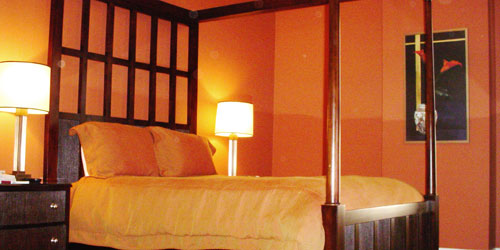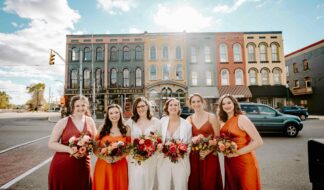By Andrea Poteet

The Inn on Ferry Street, which opened in 2001, sits among iconic landmarks like Wayne State University in a Detroit neighborhood rich with history. But behind its brick facade is a history visitors don't expect.
The inn's four mansions and two carriage houses are some of the last remaining remnants of the area's charming Victorian past. The buildings began life in the 1880s as farm homes in the then-ritzy neighborhood in Midtown.
In the decades that followed, they changed hands and sometimes sat unoccupied as the neighborhood evolved. They stood as the neighborhood turned from part of the Ferry Seed Company to a predominantly Jewish neighborhood to the home of a black population who established local businesses and health institutions. Eventually, the buildings were turned into women's dorms for the nearby Merrill-Palmer Institute before they were bought by the Detroit Institute of Arts in the 1970s. In the early 90s, the DIA, which rarely used the properties, was faced with the prospect of breaking them up to sell to several buyers.
At that point, the University Center Cultural Association stepped in. Organized by leaders from Wayne State, the DIA and other area organizations back in 1976, its purpose was to guide development in the Midtown area. The UCCA purchased the entire block of buildings, beginning a decade-long process of turning the lost pieces of history into a thriving inn.
The $8.5 million project was funded by no less than 254 sources, including charitable foundations, federal and county loans and tax credits. Funding took nearly ten years and was the hardest part of the project, UCCA President Sue Mosey said, but the renovations finally began in February 2000 and the inn opened after 18 months of construction.
"I think we felt that we could step in early in this part of the neighborhood and make a major investment that others would follow … which did happen," Mosey said. "There's been a lot of other developments that happened in that neighborhood since we built this development."
In the decade between the original plan and the inn's opening, 1,500 housing units and 44 residential projects have sprung up in Midtown.
Now, the inn is a successful aspect of the neighborhood's makeup, bringing in guests headed to job interviews at the Detroit Medical Center or Wayne State as well as local history nuts and architecture aficionados.
The inn's sales manager, Stephanie Chapman, said the inn helps change visitors' minds about the Detroit's reputation for being dangerous.
"We get people who come in and stay with us who don't particularly have the best perception of Detroit," Chapman said. "A lot of people are really wary and frankly scared … but a lot of times we change people's opinions around."
Chapman said many of the guests are stunned to realize the charming mansions had sat empty and abandoned for years.
"They're very impressed," she said. "They're really surprised and they're always really interested to find out the back story and how things happened. A lot of people are just kind of amazed that something like this exists in Detroit."
For one group who visited the inn last summer, the shock at seeing the inn's makeover was tinged with hints of nostalgia. The group was made up of women who had lived in the buildings when they were dormitories for the Merrill-Palmer Institute, now part of Wayne State, and came back to stay in their revamped former rooms.
"They recognized things," Chapman said. "Some of the women were like 'My room has been split into two rooms!', but they were mostly really impressed, and excited that they could stay here again."
Mosey said the inn, which usually runs at 70 to 75 percent occupancy, has done well since it opened.
"We have a very nice mix of people who use it, especially people who are brought here by the cultural institutions in the area," she said. "People are very interested in the history of the block and the individual buildings. There's a lot of people who value history, value historic architecture, so there's a lot of people who come for that reason. It's also just a very unique place."










